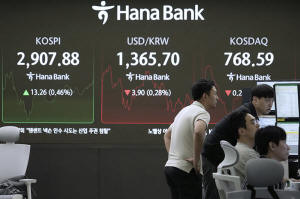Global shares gain while oil prices ease on Day 4 of latest Israel-Iran
crisis
[June 16, 2025] By
JIANG JUNZHE
HONG KONG (AP) — Global shares have advanced and oil prices have fallen
back slightly as Iran unleashed a fresh wave of missile attacks on
Israel early Monday.
Israel’s attack on Iranian nuclear and military targets caused the price
of oil to surge more than 7% on Friday since Iran is one of the world’s
major producers of oil, though sanctions by Western countries have
limited its sales.
A wider war could slow the flow of Iranian oil to its customers and keep
prices of crude and gasoline higher for everyone worldwide. But early
Monday, those concerns appeared to abate slightly.
U.S. benchmark crude oil lost 73 cents to $72.25 per barrel. Brent
crude, the international standard, gave up 73 cents to $73.50 per
barrel. They are trading at their highest levels so far this year.
In share trading, the futures for the S&P 500 and the Dow Jones
Industrial Average were up 0.5%.
Germany's DAX gained 0.2% to 23,572.39 and the CAC 40 in Paris edged
0.6% higher to 7,728.66. Britain's FTSE 100 inched up 0.3% to 8,876.26.
During Asian trading, Tokyo's Nikkei 225 added 1.3% to 38,311.33, while
the Kospi in Seoul gained 1.8% to 2,946.66.
Chinese markets gained after data for May showed stronger consumer
spending but slower growth in factory activity and investment. A 6.1%
year-on-year jump in retail sales was offset by lower than expected
growth in industrial output, which rose 5.8% from a year earlier.

Hong Kong's Hang Seng surged 0.7% to 24,060.99 and the Shanghai
Composite Index added 0.4% to 3,388.73.
Australia's S&P/ASX 200 was little changed at 8,548.40.
On Friday, the S&P 500 sank 1.1% and the Dow industrials dropped 1.8%.
The Nasdaq composite lost 1.3%.
Companies that use a lot of fuel as part of their business and need
their customers feeling confident enough to travel suffered some of the
sharpest losses. Cruise operator Carnival dropped 4.9%. United Airlines
sank 4.4%, and Norwegian Cruise Line Holdings fell 5%.
[to top of second column] |

Currency traders watch monitors near a screen showing the Korea
Composite Stock Price Index (KOSPI), top left, and the foreign
exchange rate between U.S. dollar and South Korean won, top center,
at the foreign exchange dealing room of the KEB Hana Bank
headquarters in Seoul, South Korea, Monday, June 16, 2025. (AP
Photo/Ahn Young-joon)
 They detracted from gains for U.S.
oil producers and other companies that could benefit from increased
fighting between Israel and Iran.
Exxon Mobil rose 2.2%, and ConocoPhillips gained 2.4% because the
leaping price of crude portends bigger profits for them.
Contractors that make weapons and defense equipment also rallied.
Lockheed Martin, Northrop Grumman and RTX all rose more than 3%.
The price of gold has climbed as investors search for safer places
to park their cash. An ounce of gold added 1.4% on Friday and was
holding steady early Monday.
Prices for Treasury bonds will likewise rise when investors are
feeling nervous, but Treasury prices fell Friday, which in turn
pushed up their yields, in part because of worries that a spike in
oil prices could drive inflation higher.
Inflation has remained relatively tame recently, and it’s near the
Federal Reserve’s target of 2%, but worries are high that it could
be set to accelerate because of President Donald Trump’s tariffs.
A better-than-expected report Friday on sentiment among U.S.
consumers also helped drive yields higher. The preliminary report
from the University of Michigan said sentiment improved for the
first time in six months after Trump put many of his tariffs on
pause, while U.S. consumers’ expectations for coming inflation
eased.
In currency trading early Monday, the U.S. dollar gained to 144.18
Japanese yen from 144.03 yen. The euro rose to $1.1582 from $1.1533.
All contents © copyright 2025 Associated Press. All rights reserved |